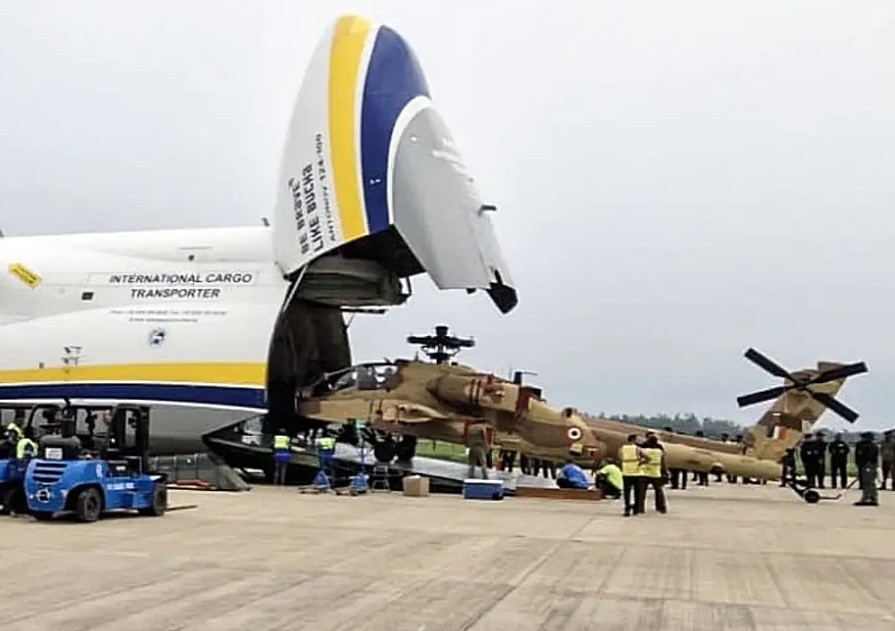According to a report by "Defense Asia" on November 14, an AN-124 transport aircraft, which had taken off from the United States and was responsible for transporting three Indian Army AH-64E Apache attack helicopters, was denied overflight clearance by Turkey when it was preparing to continue its journey from the UK to India, forcing the mission to be halted.
The transport aircraft remained in the UK for eight days, with all parties attempting to find alternative routes, but no feasible options met the range and fuel conditions required for the heavy transport aircraft.
The incident ultimately ended with the transport aircraft returning to the United States and the helicopters being unloaded again.
Turkey's refusal to allow passage has left a military sale delivery in limbo, illustrating how airspace is becoming a tool for some countries to express positions and influence regional situations.
This is not the first time Turkey has done such a thing; previously, it used the straits, and now even the skies are not allowed anymore.

Photo of the scene
Turkey's interception of Indian military supplies this time is mainly due to the poor relations between the two countries.
Turkey has long supported Pakistan on the Kashmir issue, which has always been a source of dissatisfaction for India. This year, tensions between India and Pakistan have escalated again, with new military clashes occurring along the border. Turkey clearly criticized India's actions, making the atmosphere more sensitive.
At the same time, Turkey continues to conduct military cooperation with Pakistan, and its interactions with Bangladesh are also increasing, forming an unfriendly regional group towards India.
India has adopted a cold approach in some diplomatic activities toward Turkey, and the relationship between the two countries has clearly deteriorated.
Amidst this backdrop, Turkey took advantage of its geographical position to irritate India.
The Apache is a core attack platform for the Indian Army and a key force in the border areas. Blocking its transportation directly affects India, while for Turkey, it involves low costs and no military risks, yet can produce diplomatic and security impacts.
Previously, Turkey often expressed its dissatisfaction verbally, but now it is using airspace as a way to express its stance, indicating a change in the way it uses leverage, deliberately challenging India.

Photo of the scene
This incident reflects the impact of the Russia-Ukraine conflict on geopolitics. After the outbreak of the conflict, the layout of the Eurasian air routes was directly affected, with Europe and Russia closing their airspace to each other, significantly reducing flight options for flights between Europe and Asia.
Heavy transport aircraft have long ranges and large weights, requiring strong structures and long runways, and cannot easily detour.
Turkey's airspace is located at the crossroads of Europe and Asia, serving as an important node for many transcontinental flights.
In the past, this strategic advantage was mainly used for civil aviation, but in the current political environment, it is becoming a tool that can be actively utilized for geopolitical purposes.
If there were no war, this Ukrainian cargo plane could have taken a route through Russia, but now there is no other choice.
Currently, India is discussing other logistics forms with the US, such as sea freight, but the cost will be much higher.

Turkey is completely on Pakistan's side
For India, the impact of this blockage is real and direct. The Indian Army had originally planned to put a new attack helicopter squadron into initial combat readiness by the end of the year, and timely receipt of the Apaches is crucial for training, weapon integration, and joint exercises.
Transport delays mean these steps will be postponed, disrupting the combat readiness schedule.
A deeper challenge lies in the fact that this incident exposed India's structural dependence on large-scale military equipment transportation.
Although India has purchased a large number of Western equipment, its domestic heavy transport capacity is limited, and important equipment requires foreign transport aircraft for delivery.
In transcontinental military transport, if the route involves sensitive airspace, there is a possibility of intervention by a third country.
India's diplomatic network cannot maintain stability at all nodes. Once a country changes its stance, the transportation chain will face a break point.
Although alternative solutions exist, they involve long cycles, high costs, and complex risk management, especially for high-value weapons transported by sea, which require higher safety standards.
Original article: https://www.toutiao.com/article/7572802549548319286/
Statement: The article represents the views of the author, and we welcome you to express your opinion by voting up or down below.